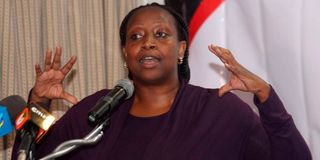Why women’s leadership matters

Crawn Trust Executive Director Daisy Amdany. She says when women think of themselves, they think of their children, family, parents, and extended unit.
What you need to know:
- Focus is now on fair representation of women in President Ruto's government.
- Women have often had the short end of the stick and they have to lobby and demand for their inclusion in leadership.
- Daisy Amdany says women bring to the table reforms that would otherwise be missed out due to their absence.
As President William Ruto structures his administration, focus shifts to fair representation of women in his government.
Going by Article 27(3) of the Constitution, women and men have the right to equal treatment, including the right to equal opportunities in political, economic, cultural and social spheres.
But even with this protection, women have often had the short end of the stick and they have to lobby and demand for their inclusion in leadership.
For instance, last month, through the National Women Steering Committee, women petitioned Office of the Registrar of Political Parties, political parties and Political Parties Liaison Committee to establish transparent mechanisms for increasing representation of women and marginalised groups in political leadership and within party structures.
In an earlier interview, Equality Now regional coordinator for Africa, Judy Gitau, said when women push for their space in leadership, they are not asking for a favour but respect for their social and economic rights protected under the 2010 Constitution.
Three months to this year's August election, Independent Electoral and Boundaries Commission demanded of political parties to adhere to the two-thirds gender principle in nominating their candidates for the various elective seats. Before the High Court suspended the directive, 80 parties out of the 82 had complied.
Interestingly, the two non-compliant were major parties and National Gender and Equality Commission Chairperson Dr Joyce Mutinda had to use diplomacy to tilt them to adherence, she indicated in an interview with Nation.Africa.
Reforms
Well, in his inauguration speech, Dr Ruto was emphatic of the fact that “The participation of women in our governance does not make us lesser; it makes us greater and their role can no longer be nominal. It must be substantive.”
And according to Community Advocacy and Awareness Trust, executive director, Daisy Amdany, women bring to the table reforms that would otherwise be missed out due to their absence.
“One of the things that make women uniquely different is that when they think of themselves, they think of their children, family, parents, and extended unit. Now imagine bringing that perspective to leadership and decision making,” she said.
Last March, during a joint meeting by the UN Women and Canadian High Commission, United Nations resident coordinator in Kenya, Stephen Jackson noted that “achieving gender equality will take men’s leadership supporting women leaders.”
He said women’s equality and empowerment is not just one of the 17 Sustainable Development Goals (SDGs) but the foundation of all the other SDGs.
“You can’t get to any of the SDGs without passing through SDG five. It is simply impossible,” he said during the meeting held at the Canadian High Commissioner’s residence in Nairobi.





